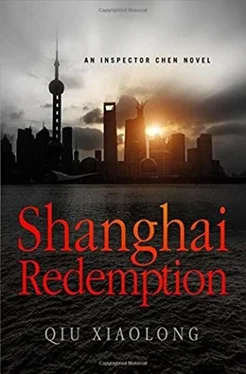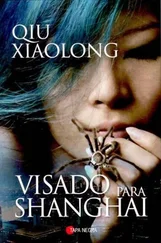Around the corner, he saw an electronics store, where he bought a player and a headphone set. He then kept on walking, going several blocks before he saw a shabby café with a bohemian ambiance. There were old worn-out chairs and tables both inside and outside. A young girl in a white T-shirt and threadbare jeans sat at an outside table, seemingly totally absorbed in a music player, her eyes half closed, her bare foot beating on the sidewalk. Chen chose a corner table inside, ordered a tall cup of black coffee, pulled out the new tape player, and put on the headphones. Drumming his fingers on the table like the girl outside, he put in the tape Peiqin passed him and started listening to it.
It started off with the conversation between Old Hunter and Tang. Chen already knew the gist of it, but some of the details might be helpful. Chen listened carefully, gulping black coffee, and taking notes.
Then came another section: the discussion between Old Hunter, Yu, and Peiqin. It was quite long, as they jumped from one topic to another over dinner. Chen listened with uninterrupted concentration. Old Hunter’s account of the ernai café was hilarious, and their speculations as to Chen’s reasons for having Old Hunter check out the café were no less intriguing. Some of the details proved to be thought-provoking, perspectives he himself wouldn’t have considered. Yu’s brief account of the missing person case was helpful too. Chen hadn’t had the time to look into it yet.
He finished his second cup of coffee before he finished listening to the speculations of “the family of cops.”
A waiter walked over and looked at him. Chen took off his headphones and asked for the menu again.
“I’d like a wedge of lemon pie,” he said to the waiter, taking out his laptop and the CD from Qian.
“So few enjoy Suzhou opera nowadays. What a pity! I have to write something that will help people appreciate it,” Chen said to the waiter.
The waiter appeared indifferent to opera. But that didn’t matter. Chen just wanted him to see Chen as a bookish opera fan, working on an article in defense of it.
Taking another sip of coffee, Chen thought he might as well take a short break and listen to the opera CD. Roughly speaking, Suzhou opera consisted of two parts: singing and narration. The singing part could be blank verse sung in the middle of the narrative, performed to musical instruments such as the sanxian and pipa, but it could also be a song performed by itself. If it was the latter, the song was usually short, four or five minutes long, and was sung as the audience arrived at the theater, a kind of prelude to the narrative episode.
The CD was composed of songs adapted from classical poems. Qian was the singer, and her passion came out in her clear voice, but the choice of the poems also spoke to her own emotions. The pieces he listened to were quiet, sentimental ones. The first was a poem written by Liu Fangping:
The sun setting against the gauze curtain, / the dusk drawing nearer, / she sheds tears, alone, / in her magnificent room. / The courtyard appears so deserted, / the spring on the decline,/ pear petals fallen, all over the ground- / too much for her / to push open the door.
The last image was subtle yet striking. She’d had no visitors-the courtyard not swept, the door not opened-for a long time.
The next one, by Li Bai, had a similar ring to it.
Waiting, she finds her silk stockings / soaked with dewdrops / glistening on the marble palace steps. / Finally, she is moving / to let the crystal-woven curtain fall / when she casts one more glance / at the glamorous autumn moon .
The deserted beauty was a popular subject in classical Chinese poems. The person complains about-but doesn’t really speak out against-her lord. In traditional literary criticism, these poems were often interpreted as being politically symbolic, representing the intellectual complaining about being neglected by the ruler.
Was that the reason these poems appealed to him at this moment?
Qian could have fallen for S. because of their apparent shared love of Suzhou opera. In this materialistic age, in which money was paramount and culture was frequently ignored, nobody seemed to be able to make a real difference in the declining fortunes of traditional opera. S.’s earlier help in bringing attention and audiences to her performances turned out not to be motivated by his love of Suzhou opera but by his lust for her. Once his objective was achieved, he didn’t have to make any more efforts on behalf of opera.
Only an idealist like her, who saw only what she wanted to see, would go forward on blind faith alone. Even her plan to go abroad seemed too unrealistic. With her experience, she might be able to get into a university and earn a degree in opera, but the idea that she could earn a living from it was just another fantasy.
Chen couldn’t help feeling sympathetic.
He forked up a bite of the lemon pie. Before he could eat it, though, his cell phone buzzed, sliding across the table as if it had a life of its own.
In a surprising coincidence, it was Qian calling him from Suzhou.
“I’ve made a couple of calls for you, Cao. About the nightclub in Suzhou-its main connection to the Heavenly World in Shanghai seems to be the law firm that represents it. S. once mentioned that law firm, though in a different context. Some of the Western companies that the law firm represented made things difficult for his office. Needless to say, someone in the firm is very powerful. Perhaps someone high up in the Party or government who is some sort of special advisor to the law firm. Someone powerful enough that S. couldn’t do anything but throw in the towel.”
“A law firm that represents the nightclub-”
“What’s so surprising about that? The club pays a large retainer to the law firm because of the firm’s connection to the people at the top of the city government. That way, no one can touch it.” She then added, “Also, I’ve talked to him.”
“Him? Oh, you mean Sima,” he blurted out. Chen had guessed who it was that morning at Cai’s Noodles. Sima, the head of the Shanghai Foreign Liaison Office, was someone Chen had known for years and had visited just a few days earlier.
“You moved fast, Cao.”
He sort of regretted blurting out Sima’s name, but it was probably just as well. She had confirmed his assumption.
“What did you say to him?”
“Not a single word about you, of course. But things can’t go on like this, so I put a little pressure on him, hinting at the consequences if he doesn’t let me go. He got it, I think.”
“Be patient, Qian,” Chen said. “In a couple of days, I may be able give you a progress report along with some evidence, and then we can talk about the next step. It’ll be more effective if you have something substantial in your hands.”
“Fine, I will wait for your report.”
“In the meantime, if you learn anything else about the nightclub, let me know.” He added in a hurry, “Don’t put any more pressure on Sima. I’ll definitely call you tomorrow.”
Afterward, he had a bad feeling about having said so much on the phone, even though it was the cell phone he’d recently purchased, its number known to only a few people.
The coffee had gone cold, he discovered, as he sipped it with distaste.
He turned off the laptop and turned his attention back to the tape.
Next came the section of the tape that had been recorded by Old Hunter at the ernai café. It was mainly small talk among the regular customers there, who kept stirring up ripples of their bored lives in their cups of coffee.
Chen started to make notes again. Gossip seemed to be the primary characteristic of the ernai’s conversation. Someone was buying a villa in Xiaoshan even more expensive than the one they owned in Binjiang; a vice mayor’s son drove his Porsche so recklessly that he wrecked it after one month; a laowai met his end suspiciously in a hotel despite the official announcement proclaiming that he died of natural causes; and dead pigs were reappearing, this time on a different river to Shanghai.
Читать дальше












